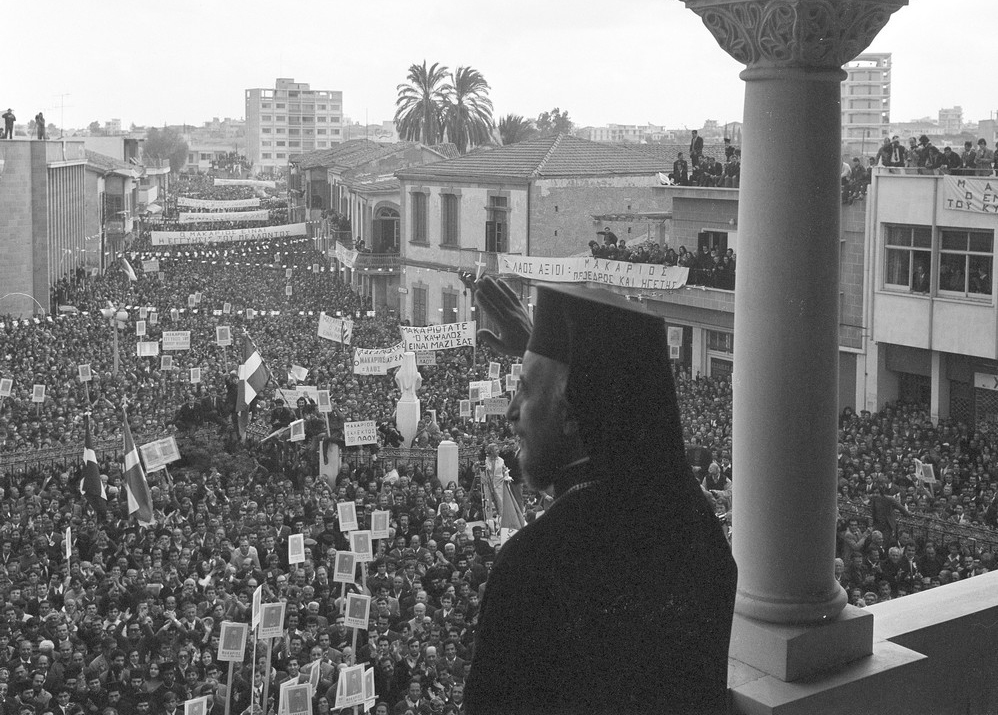A new book on the island’s leaders says the first president was incapable of taking decisions that did not have general and universal acceptance
Poor leadership, which takes decisions without study or planning, is incapable of making tough but necessary choices, is obsessed with preserving its popularity and political career and relies on patriotic rhetoric littered with unattainable goals is the reason the Cyprus problem was never settled.
This is the main thesis of the recently published book Fatal Leadership (1948 – 2021) Makarios and his Continuers by Cyprus issue scholar Leontios Ierodiakonou, who had served as a Disy deputy and minister of communications and works in the Clerides government. Ierodiakonou highlights the many missed opportunities and bad choices made by the Republic’s presidents from 1948 to the present day.
The bad example was set by Archbishop Makarios – long before he became Cyprus’ first president – who was, nevertheless extremely popular and regarded a great leader and statesman by the vast majority of Greek Cypriots. This may have been because he placed his popularity above everything, which also saw him try to pass on responsibility for the few tough decisions he was forced to take on others.
The author quotes close associates of Makarios, none of whom had critical intentions, pointing out his obsession with his personal popularity. Nikos Kranidiotis, his closest aide in the period leading to independence, was quoted as saying: “He always had an extreme sensitivity towards those who disagreed with him and tried in every way to avoid criticism and to appease them.” Former president Glafcos Clerides said he knew “how sensitive he was to public sentiment and how much he disliked the idea of his prestige being diminished.”
After the Enosis referendum in January 1950, which he organised, and his election as Archbishop in October of the same year, he resolved to ‘internationalise’ the Cyprus issue, by taking the Greek Cypriot demand for self-determination and union with Greece to the United Nations. The government of Greece which was dependent on Britain at the time refused to sanction such a move because they did not want to clash with the British government. They did not bow to Makarios’ pressure so in 1953, he defiantly sent a letter to the UN Secretary-General asking that the demand of the Cypriot people for self-determination was included on the agenda of the 8th General Assembly.
The Greek government did not back the demand, wanting the issue to be settled in a friendly way with Britain, but Makarios used the Greek media to put pressure on the government so a year later the request was signed by Greece. This turned out to be a big mistake as the British decided to involve Turkey in the Cyprus problem; the British representative at the UN raised the issue of the Turkish Cypriot minority and had the full backing of Turkey. From then on London “opened the way to Turkey to appear as an interested party.” Greece’s recourse was rejected, but Turkey, at the instigation of Britain was in the picture and would never leave, or agree to enosis.
“The start of the disastrous involvement of Turkey in Cyprus, commenced openly and officially with the first steps for internationalistion of the Cyprus issue, which Makarios sought and Greek governments opposed.” There was a total of five recourses to the UN, at Makarios’ insistence, which achieved nothing apart from Turkey direct involvement in Cyprus.
With the Eoka struggle in progress, the new Governor, Sir John Harding, presented Makarios with a proposal for ‘constitutional evolution’ which envisaged elections and self-government and did not rule out self-determination, but opted for vagueness on the date. Early in 1956 the Colonies Secretary, Alan Lennox-Boyd arrived, but at their meeting Makarios demanded a specific date for self-determination, causing the British minister to leave the meeting with the quip, “may God save your people.” The author contends that it was “naïve for someone to believe this position would change at an informal meeting and at such a time,” speculating that Makarios was unaware of the political climate of the period.
Makarios failed to persuade Grivas to agree to the British proposals, which he wanted to accept but refused to take such a responsibility. He wanted the Greek government of Constantinos Karamanlis to announce acceptance of the Harding proposals and he would follow suit but Athens refused to oblige, telling him it would back his decision. Ierodiakonou sees this as another missed opportunity, especially as the British government was only talking to the Greek Cypriots – Harding’s negotiations with Makarios lasted five months – and had not involved the Turkish Cypriots.
More proposals, followed. One by the new governor Sir Hugh Foot was rejected by Turkey, despite its author believing it favoured her. It was followed by Prime Minister Harold Macmillan’s plan, which was even more favourable to Turkey and was euphemistically known as the ‘partnership plan’. Ierodiakonou described it as the “climax of the promotion of Turkish interests by the Conservative government” as it “ruled out enosis and partition, but introduced partitionist elements.” He writes that it constituted “the complete failure and bankruptcy of Greek Cypriot policy.”
In September 1958 Makarios signalled his acceptance of independence and the end of the Eoka struggle, but did not have the political courage to make this clear to Greek Cypriots. Meanwhile, with enosis abandoned by Makarios, Britain, Greece and Turkey put their differences behind them to bash out a deal. In six days in February 1959, in Zurich the foreign ministers of Greece and Turkey put together an agreement and the representatives of the two communities were invited to London, later in the month to sign it.
Although he had been fully briefed by Greek PM Karamanlis in Athens, when he went to London Makarios engaged in the customary brinkmanship, refusing to sign when asked for a ‘yes’ or ‘no’ answer. He was given until the next day, when he finally gave his consent. There was point to this theatre – he wanted to put the responsibility for acceptance of the agreement on Karamanlis and his foreign minister Evangelos Averof.
On November 30 1963 he submitted the ’13 points’ for the amendment of the constitution which he felt was unworkable, despite repeated warnings from the Greek government not to do so. He went ahead as there was a power vacuum in Greece and a few weeks later fighting broke out and the Green Line was created. Makarios subsequently renounced the treaties of alliance and guarantee, but when he was warned this could lead to a Turkish invasion he backed down, saying he had been misunderstood. UN troops arrived in 1964 to guard the Green Line and have been with us ever since.
Makarios renounced enosis in 1967 and said he would follow a policy of the ‘attainable.’ This led to the eventual creation of Eoka B. In 1972, after four years of negotiations, Clerides and Turkish Cypriot leader Rauf Denktash reached agreement. The Turkish Cypriots had accepted the ’13 points’ for amendment of the constitution and Clerides sought the authorisation of Makarios to sign it. The Archbishop refused to give his consent, again defying the advice of the Greek government of the time and the UN representative Ozorio Tafal.
Clerides wrote in ‘My Deposition’, that “Makarios’ decision not to compromise, despite all the concessions of the Turkish side proved fatal for him and Cyprus… the coup would have been avoided, the invasion would not have happened and Cyprus would have been spared a host of catastrophes.”
Makarios returned to Cyprus five months after the Turkish invasion, in December 1974, with his message of the “long, unyielding struggle until vindication.” The writer pointed out the folly of the message.
“Again here he overestimates – in effect deifies – the power of the just and completely ignores the painful realities. The long unyielding struggle would have meaning, if there was a prospect in the future, not to overturn, but perhaps to have a balance, or at least approach the opponent, in military power. This prospect did not exist.”
Although he had accepted the bizonal federation in 1975, and signed the top level agreement with Denktash that paved the way for this in February 1977, a month later he was trying to persuade the national council that bizonality was a good idea. As the writer notes repeatedly, “he was incapable of taking decisions that did not have general and universal acceptance.”
And five months after signing the agreement with Denktash he brought up the “long, unyielding struggle” again without explaining how it would be staged.
At the July 20 rally in 1977, 14 days before his death, he said: “As to the means and the way it will be staged, I do not think I should talk analytically and say too much. I will just say that the long struggle will gradually take many forms.”
This vagueness, tendency for mixed messages, lack of courage, refusal to take tough decisions, obsession with personal popularity were the leadership qualities bequeathed by Makarios to most of his successors. Spyros Kyprianou, Tassos Papadopoulos and Nicos Anastasiades are cited as continuers of his legacy, which also ensured the Greek Cypriots had no trustworthiness in the international community.
Leontios Ierodiakonou’s book, Fatal Leadership, is available in Greek







Click here to change your cookie preferences